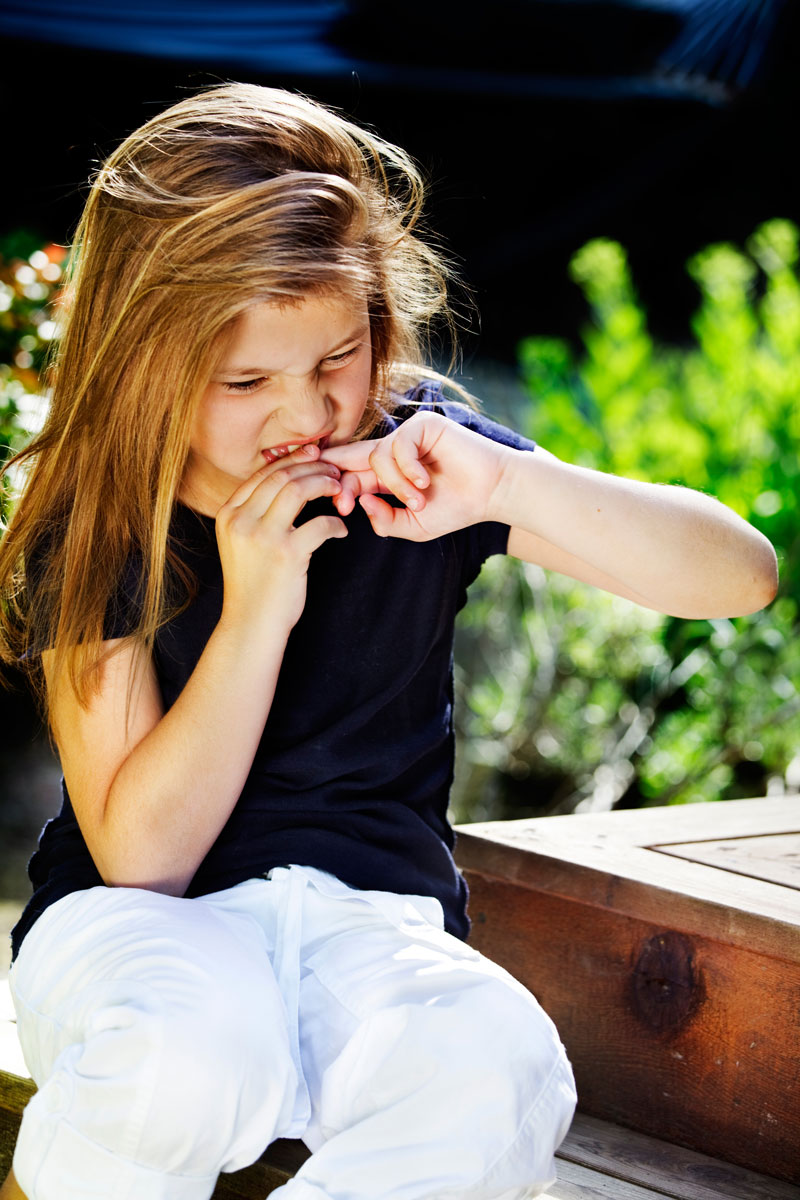Repetitive Behaviors
Repetitive Behaviors Specialist in Greenwich, CT
Repetitive behaviors are a group of conditions characterized by the repetitive engagement in certain actions or behaviors. These behaviors often serve as a way to cope with stress, anxiety, or boredom. At C-OATS, we specialize in treating several types of repetitive behaviors, including trichotillomania (hair-pulling disorder), excoriation (skin-picking disorder), and onychophagia (nail-biting). Each of these conditions presents its unique challenges and requires tailored treatment approaches to help individuals regain control and improve their overall well-being.
Types of Repetitive Behaviors
Repetitive behaviors encompass various conditions, including:
Trichotillomania: A condition characterized by the recurrent pulling, plucking, or twisting of one’s hair, resulting in noticeable hair loss. It is often triggered by stress or boredom and can lead to feelings of shame and embarrassment.
Excoriation: Also known as dermatillomania, it involves the compulsive picking of the skin, often targeting areas such as pimples, scabs, or bug bites. The repetitive picking can result in bleeding and potential skin damage.
Onychophagia: Commonly referred to as nail-biting, it involves the habitual biting and tearing of fingernails, sometimes leading to bleeding and soreness. Nail-biting is prevalent, especially among school-aged children, and can be a response to anxiety or stress.

Effective Treatment Options for Repetitive Behaviors
At C-OATS, we offer evidence-based treatments for repetitive behaviors, with a focus on Cognitive Behavioral Therapy (CBT). CBT has been shown to be an effective front-line treatment for various repetitive behaviors. Our treatment approach may include:
Habit Reversal Training (HRT): HRT is a behavioral therapy technique that aims to increase awareness of the repetitive behavior and replace it with a more constructive action. This approach helps individuals develop alternative coping strategies and reduce the urge to engage in the repetitive behavior.
Comprehensive Behavioral Treatment (ComB): ComB involves a comprehensive assessment of the individual’s behavior patterns and triggers. Based on the assessment, tailored interventions are implemented to address the underlying factors contributing to the repetitive behavior.
Acceptance and Commitment Therapy (ACT): ACT focuses on acceptance of the repetitive behavior while encouraging individuals to commit to value-driven actions. This therapy aims to improve emotional flexibility and develop healthy ways to cope with distress.
Dialectical Behavior Therapy (DBT): DBT combines elements of mindfulness, emotion regulation, distress tolerance, and interpersonal effectiveness to help individuals manage their repetitive behaviors and build positive coping skills.
It’s important to note that no single medication has been proven effective for treating hair-pulling, skin-picking, or nail-biting. However, in some cases, medications may be prescribed to manage co-occurring psychiatric conditions. Additionally, over-the-counter supplements like N-acetylcysteine (NAC) have shown promise in reducing hair-pulling and skin-picking behaviors.
Causes of Repetitive Behaviors
The exact causes of repetitive behaviors are not fully understood. However, they are believed to be influenced by a combination of genetic, environmental, and psychological factors.
Some individuals may have a genetic predisposition to developing these behaviors, while others may engage in them as a way to manage emotional distress or regulate anxiety. Understanding the underlying causes can help inform the most effective treatment strategies.
Our Approach
At C-OATS, we specialize in the treatment of repetitive behaviors and have extensive expertise in addressing these challenges. Our approach is rooted in evidence-based interventions, such as Cognitive Behavioral Therapy (CBT) and Habit Reversal Training (HRT). We take a personalized approach, tailoring our treatments to the unique needs of each individual. Our goal is to provide comprehensive care that addresses the underlying causes and triggers of repetitive behaviors. We work collaboratively with our clients and their families, creating a supportive environment where they feel heard and empowered. With our holistic approach and commitment to ongoing support, we strive to help individuals overcome repetitive behaviors and achieve long-lasting improvements in their well-being.
Why Choose C-OATS for Repetitive Behaviors Treatment
At C-OATS, we are dedicated to providing exceptional care for individuals with repetitive behaviors. Here’s why you should choose us:
Specialized Expertise: Our team consists of experienced professionals who specialize in treating repetitive behaviors, ensuring that you receive expert care tailored to your specific needs.
Evidence-Based Approach: We utilize evidence-based therapies, such as CBT, to deliver effective treatment that addresses the underlying causes of repetitive behaviors.
Collaborative Approach: We believe in collaborating with our clients and their families to develop personalized treatment plans that consider their unique circumstances, preferences, and goals.
Holistic Care: Our treatment approach focuses on the holistic well-being of individuals, considering not only the repetitive behaviors but also their impact on mental health, social functioning, and overall quality of life.
Compassionate Support: We provide a compassionate and supportive environment where individuals feel safe to share their concerns and work towards positive change.
Tips for Helping Your Child with Repetitive Behaviors
Supporting a child with repetitive behaviors requires patience, understanding, and a supportive environment. Here are some tips to assist your child:
- Educate Yourself: Learn about the nature of repetitive behaviors and their impact on your child’s well-being. Understanding the underlying factors can help you provide better support.
- Open Communication: Encourage open communication with your child. Create a safe space where they can express their feelings and concerns without judgment. Listen actively and validate their experiences.
- Develop Coping Strategies: Work with your child to develop healthy coping strategies that can replace repetitive behaviors. Help them identify alternative activities or hobbies that provide sensory stimulation or emotional relief.
- Establish a Routine: Establishing a structured routine can help reduce anxiety and provide a sense of predictability. Ensure that your child has regular mealtimes, sleep schedules, and designated times for engaging in activities they enjoy.
- Set Clear Boundaries: Establish clear boundaries around repetitive behaviors. Help your child understand the appropriate times and places for engaging in these behaviors, and gently redirect their attention when needed.
- Offer Emotional Support: Provide emotional support and reassurance to your child. Help them build resilience and self-esteem by highlighting their strengths and encouraging their efforts to manage their behaviors.
- Seek Professional Help: If repetitive behaviors persist or significantly interfere with your child’s daily functioning, consider seeking professional help. A qualified therapist or psychologist with expertise in repetitive behaviors can provide guidance and evidence-based interventions.
- Practice Self-Care: Taking care of yourself is essential when supporting a child with repetitive behaviors. Prioritize self-care, seek support from others, and engage in activities that help you recharge and maintain your well-being.
- Create a Supportive Environment: Foster a supportive and understanding environment at home and in other settings. Educate family members, teachers, and caregivers about your child’s condition to promote empathy and effective support.
- Celebrate Progress: Recognize and celebrate your child’s progress, no matter how small. Positive reinforcement and encouragement can go a long way in motivating and inspiring them to continue their journey toward managing repetitive behaviors.
Remember, each child is unique, and what works for one may not work for another. Trust your instincts as a parent and adapt strategies to meet your child’s specific needs. With patience, support, and professional guidance, you can help your child navigate and manage their repetitive behaviors effectively.
FAQs
Are repetitive behaviors only seen in children?
Repetitive behaviors can occur in both children and adults, although they may present differently based on age and individual circumstances.
Are repetitive behaviors considered mental disorders?
Repetitive behaviors, such as trichotillomania, excoriation, and onychophagia, are classified as mental disorders and can significantly impact an individual’s daily functioning and well-being.
Can repetitive behaviors be completely cured?
While complete eradication of repetitive behaviors may not always be possible, effective treatment can significantly reduce their frequency and impact on an individual’s life.
How long does treatment for repetitive behaviors typically last?
The duration of treatment for repetitive behaviors varies depending on the individual and the severity of the condition. It can range from several weeks to several months or longer.
Can medications help in the treatment of repetitive behaviors?
Medications are not the primary treatment for repetitive behaviors; however, in some cases, they may be prescribed to manage underlying psychiatric conditions that co-occur with repetitive behaviors.
Can repetitive behaviors be triggered by stress?
Yes, stress and emotional distress can often trigger or exacerbate repetitive behaviors. Learning healthy coping mechanisms is an essential part of treatment.
Is it possible to engage in repetitive behaviors without realizing it?
Yes, repetitive behaviors can sometimes occur automatically or without conscious awareness. Part of the treatment process involves increasing self-awareness and developing strategies to interrupt these behaviors.
Can repetitive behaviors be contagious or learned from others?
Repetitive behaviors are not contagious but can sometimes be observed and learned through environmental cues or modeling behaviors of others.
Are there any support groups or resources available for individuals with repetitive behaviors?
Yes, there are support groups and online communities that provide a platform for individuals with repetitive behaviors to connect, share experiences, and access valuable resources.
Can children outgrow repetitive behaviors over time?
Repetitive behaviors may persist into adulthood if left untreated; however, with appropriate intervention, many individuals can learn to manage and reduce the frequency of these behaviors as they grow older.
Q&A With Emily Carr, Practice Manager
This month, get to know Emily Carr, the engine behind our office. As our Practice Manager, she handles our operations and ensures that our families feel well supported. Enjoy getting to know Emily! How does your medical/clinical background uniquely position you to...
C-OATS Spotlight on Dr. Catherine McNulty, Ph.D.
In celebration of Women’s History Month, an annual celebration of women’s contributions to history, culture and society, we’re putting Dr. Catherine McNulty, at center stage. Dr. McNulty joined the C-OATS team over a year ago and has quickly connected with...
A Parent’s Guide to Child Anxiety Treatment
While occasional anxiety is a common and an expected part of life, anxiety disorders go far beyond temporary worry or fear. The symptoms of anxiety can be crippling and interfere with daily functioning and activities, thus impacting a child’s well-being, development,...
Talk With Us
WE LOOK FORWARD TO HEARING FROM YOU. A MEMBER OF THE C-OATS TEAM WILL RESPOND BACK WITHIN 24-48 HOURS UPON RECEIVING YOUR MESSAGE.





